-
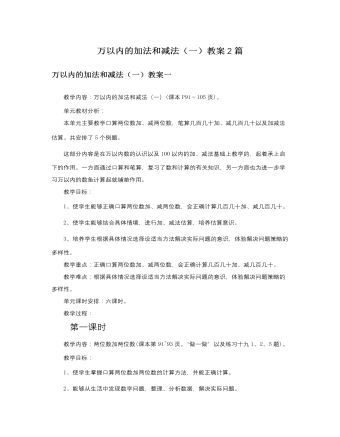
人教版新课标小学数学二年级下册万以内的加法和减法(一)教案2篇
3.小结。引导学生归纳两位数加减法的口算步骤:要把加上或减去的两位数看成一个整十数和一个一位数,先算两位数加、减整十数,再算两位数加减一位数。三、巩固练习课本第93页的做一做。分别指名口算,并说说怎么想的。四、全课总结1.根据学生回答,教师归纳小结并出示课题:口算两位数加、减两位数。2.口算两位数加、减两位数应注意什么?五、布置作业教后反思《标准》提倡算法多样化,目的是提倡学生个性化的学习。本单元仍然注意体现这一理念,如本课时教学口算两位数加、减两位数时,既呈现了口算方法,还出现了在脑中想竖式的方法;在教学笔算时,还出现口算的方法。其目的就是鼓励学生展开思路,在交流、比较的基础上不断地完善自己的想法,学习计算方法。
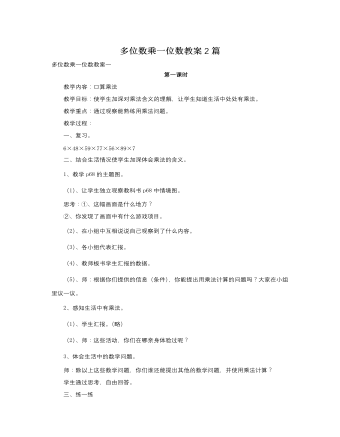
人教版新课标小学数学三年级上册多位数乘一位数教案2篇
教学内容:口算乘法教学目标:使学生加深对乘法含义的理解,让学生知道生活中处处有乘法。教学重点:通过观察能熟练用乘法问题。教学过程:一、复习。6×48×59×77×56×89×7二、结合生活情况使学生加深体会乘法的含义。1、教学p68的主题图。(1)、让学生独立观察教科书p68中情境图。思考:①、这幅画面是什么地方?②、你发现了画面中有什么游戏项目。(2)、在小组中互相说说自己观察到了什么内容。(3)、各小组代表汇报。(4)、教师板书学生汇报的数据。(5)、师:根据你们提供的信息(条件),你能提出用乘法计算的问题吗?大家在小组里议一议。2、感知生活中有乘法。(1)、学生汇报。(略)(2)、师:这些活动,你们在哪亲身体验过呢?3、体会生活中的数学问题。师:除以上这些数学问题,你们谁还能提出其他的数学问题,并使用乘法计算?学生通过思考,自由回答。
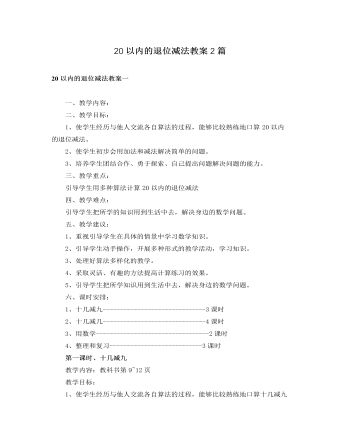
人教版新课标小学数学一年级下册20以内的退位减法教案2篇
一、揭题:小朋友们,今天我们一起来做练习。二、练习:1、第8题:这是一道计算题。(1)明确要求:看谁算得又对又快。(2)学生独立完成。(3)订正答案。(4)有错的学生,说一说计算顺序是怎样的,每一步的计算结果是多少?2、第9题:这是一道用数学的题。(1)看图,同位两个互相说说图意,并提出数学问题。(2)根据问题列算式解答。(3)订正答案。3、第10题:比一比。(1)明确要求,看谁先夺得红旗。(2)各小组派代表参加比赛。(3)对算得又对又快的学生提出表扬,并奖励给一个小标志。(4)再加入几组比赛题,尽量让学生多参与。4、第11题:这是一道用数学的题。(1)看图,说图意,提出数学问题。(2)列算式解答,指名板演订正。(3)说一说为什么用加法计算?5、思考题:小组讨论完成。一共12人,每两人之间插入一个女生,一共能插入11人。
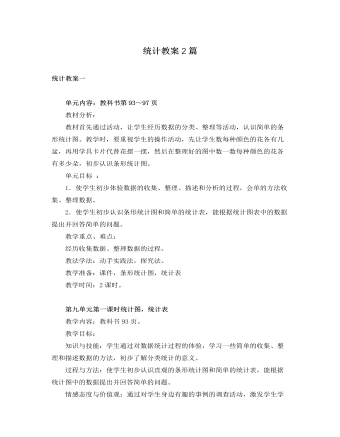
人教版新课标小学数学一年级下册统计教案2篇
2、揭题:小朋友们,知道吗?刚才你们的学习过程其实就是统计的过程,这节课我们就一起来研究统计的有关知识。3、发统计图和统计表:根据你刚才收集的数据,完成统计图和统计表。实践活动(调查全班小朋友们喜欢的动物)统计表:(学具卡片)绿孔雀非洲象大熊猫袋鼠梅花鹿河马统计图:(学具卡片)绿孔雀非洲象大熊猫袋鼠梅花鹿河马4、出示统计图和统计表。(1)通过小朋友们的统计,你能发现什么?(2)你可以提出什么问题?三、总结:1、日常生活中有许多事情可以用统计解决,你能说一说吗?2、谈谈这节课你的收获。作业布置:第二课时、练习教学内容:完成练习十七的2——4题。教学目标:巩固本单元所学的内容。教学过程:一、检查作业:1、小组互相交流自己调查的结果。2、展示几份。二、练习:练习十七1、第2题。(1)看图,明确题意。(2)先用自己喜欢的方法统计。(3)完成统计表及问题。(4)集体订正。
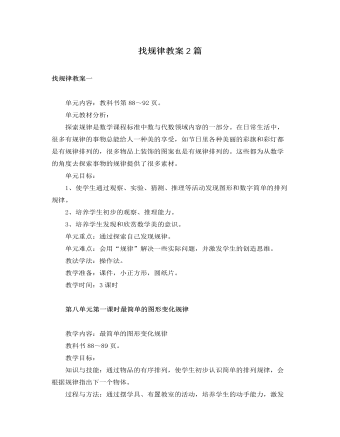
人教版新课标小学数学一年级下册找规律教案2篇
教学内容:教科书91页。教学目标:1、使学生通过观察、实验、猜测、推理等活动发现数字简单的排列规律。2、培养学生初步的观察、推理能力。3、培养学生发现和欣赏数学美的意识。教学重点:通过探索自己发现规律教学难点:会用“规律”解决一些实际问题,并激发学生的创造思维。教学过程:一、揭题:小朋友们,上节课我们不仅探索了有关图形的规律,而且还探索了有关数字的规律,这节课我们继续来学习。二、探索新知:1、学习例7。(1)小组合作学习例7,你们能发现什么规律?(2)学生小组活动。(3)汇报交流:第1组都是加1,第2组都是加2,第三组也是加2。2、学习例8。(1)小组合作学习例7,你们能发现什么规律?(2)学生小组活动。(3)汇报交流:第1组都是加5,第2组都是加3。三、完成做一做。四、学生创造性地思考其他有规律的数字排列。五、总结:通过这节课的学习,你有什么收获?作业布置:
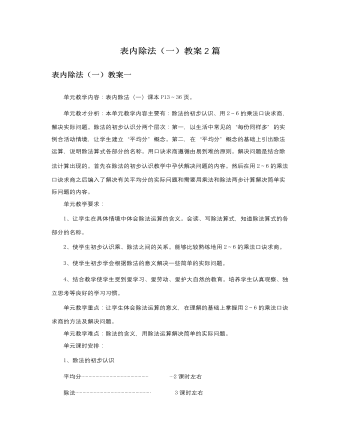
人教版新课标小学数学二年级下册表内除法(一)教案2篇
教后反思本节课给学生创设了良好的活动空间,把学生实际生活中听说过的见到的平均分现象展示给学生看,把生活和数学联系起来,在学生感受“同样多”的基础上概括出什么叫平均分。揭示平均分这一数学知识在生活中的应用,之后突出了学生三次实际操作。第一次,小组同学互相分水果,重视学生分的结果。体会感受“平均分”的含义。第二次,重视分法:15个橘子平均分成5份。体现了学生对物品的不同分法,建立了平均分的概念。第三次,分矿泉水,通过份数变化,观察分的就结果,深刻体会“平均分”,为认识除法积累丰富的知识。为学生营造探索的空间。第二课时:平均分的认识(二)教学内容巩固“平均分”。课本第15页的例题3。教学目标1.巩固“平均分”的概念,知道平均分就是每一份分得结果同样多。
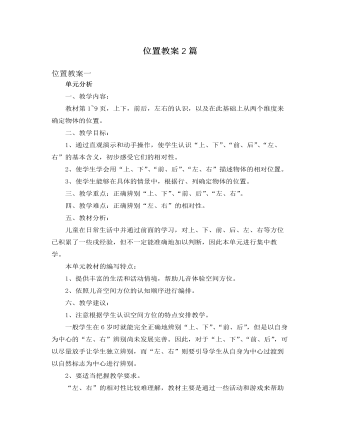
人教版新课标小学数学一年级下册位置教案2篇
1、找一找 (计算机演示图意)2、师:星期天,小江想到小明家去玩,可他只记得小明家住在三楼的左边,你们能告诉他小明家住几号房吗?(展开讨论,计算机学示结果)2、想一想师:我跟大家面对面地站着(老师举起右手),请问:老师举起的是右手吗?师:(老师把右手放下)请小朋友把右手举起来再判定一下老师举起的是不是右手。(老师又举起右手)学生讨论老师举着右手转身与学生同向,证实结论。师:我们面对面地站着,因为方向相对,举的右手就会刚好相反。练习:老师和学生一同举左手体验。四、 解决问题,增强应用意识1、说一说:你相邻的同桌都有谁?问:相邻是什么意思?面对黑板说说你相邻的同学有谁?背对黑板说说你相邻的同学有谁?侧转身再说说你相邻的同学有谁?师:每转一次前、后、左、右的人都发生了变化,但相邻的同学总是这几个。2、用电脑演示同学们上下楼梯的情景

人教版新目标初中英语七年级下册How was your weekend教案2篇
Teaching Goal:1. General aims:Talk about recent past events2. Particular aims:A. Language Focus.Talk about recent past events and think of the past events.B. Language goalsHow was….?It was …What did …do over the weekend?C. Language structures:(1). How was your weekend? I was great. Pay attention to no form.(2). What did you do over the weekend? I played soccer. We went to the beach.D. Useful words and phrases:Words: was, did, went, beach, over, project, test, wasn’t, false, number, geography, spend, week, most, mixture, their, had, little, cook, read, saw, change, everyone, sit, sat, no, anythingPhrases: did one’s homework, played soccer, cleaned my room, went to the beach, played tennis, went to the movies, on Saturday morning, over the weekend, cook … for, what about, do some reading, have a party, talk show, go shoppingE. Grammar language:Present simple past tenseRegular and irregular verbsF. Learning strategies:Tour and holidaysG. Interdiscipinary:H. Emotion and manner:Teaching time: 5 periodsTeaching procedures:Period One教学步骤、时间 教师活动 学生活动 媒体应用Step 1Free talk 3’ Ask some questions like:Who’s on duty today?What’s the weather like? Answer and talk about something.让同学们回答下列问题1. Do you like weekend? (Let some students answer)It takes them three minutes to talk about the question.2. Why do you like weekend? (let the students answer) Most of the students like the weekend此时教师用汉语问:“在周末期间问你干了什么?这句话用英语这么回答?Let the students guess.At last the teacher give them right answer3. What did you do over the weekend?(板书、学习)

人教版新目标初中英语七年级下册Where is the post office教案2篇
Period 2 (3a----Section B 2c)Preview(Pre-task): Key points: What laAdd another information about their pen pals----their language on the cardnguage does she/he speak?She/He speaks....Does she/he have any brothers and sisters? Does she/he speak English?Preview(Pre-task): Add another information about their pen pals----their language on the cardKey points: What language does she/he speak?She/He speaks....Does she/he have any brothers and sisters? Does she/he speak English?Step 1 Revision1.Revisionand dictation of the new words 2.Revise the drills they learned yesterday.(by pairwork and grammar exercise)Step 2 Leading-inT has a conversation with one student. The conversation is following:---Do you have a pen pal?---Yes, I do.---What's your pen pal's name? ---His/Her name is....---Where is your pen pal from? ---He/She is from...---Where does he/she live? ---He/She lives in....---What language does he/she speak?He/She speaks...Write the new words on the Bb. They are following: EnglishChineseJapaneseFrenchStep 3 LearnLearn the new words with the whole class.Finish 3a with the students3b Pairwork T still does an example with one student Then the Ss practise in pairs. The example is following:--Curry Muray is my pen pal. He is from the United States.---What language does he speak?
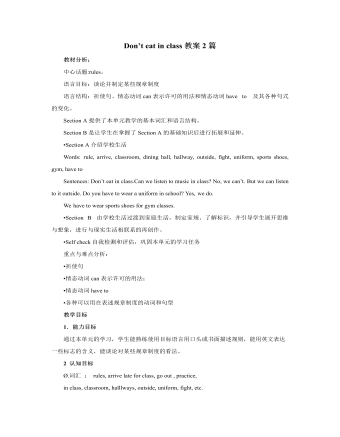
人教版新目标初中英语七年级下册Don’t eat in class教案2篇
Don’t fight. =You can’t fight. (板书,教读)教师把这些句子板书在黑板上,并请学生大声整齐地读祈使句和“can’t”句型,并让学生注意两种句型表达形式的不同和转换,“Don’t …=You can’t…”;并对学生说:These are our school rules. (板书,教读) You can’t break the school rules. Don’t break the school rules.(板书,教读)步骤3 :Practicea. T: Now, each of the students is breaking one of these rules.Please finish 1a.学生看图,完成1a的内容,检查答案并大声朗读校规。b. 听录音,完成1b,选出四位学生都违反了哪条校规;听之前,学生要读会英文名。c. 请两位学生朗读1c部分的句型;要求学生两人一组对话表演,SA扮演外校转来新生,SB告知本校校规。(学生可经过讨论,多说出他们想到的校规,不必只限于书上;教师应给予帮助)2) 第二课时(2a~4)步骤1 :warming up of revisionT: What are the rules at your school?学生使用“can”或祈使句表达各条校规;其中老师可引出“eat in the cafeteria outside”的表达。步骤2 :Practicea.T: Christina is an exchange student. She doesn’t know the rules. Let’s listen, what activities they’re talking about?学生听第一遍时,完成2a;第二遍时,完成2b;b. 请学生领读2c部分,看着2a完成的表格,理解2c活动的要求;分成小组针对2a进行问答;
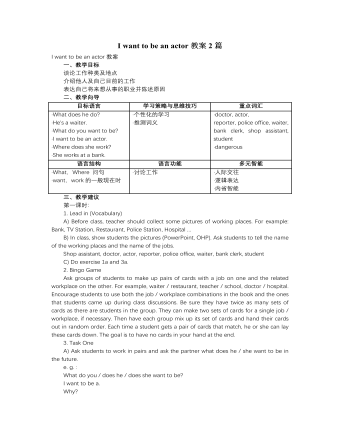
人教版新目标初中英语七年级下册I want to be an actor教案2篇
三、教学建议第一课时:1. Lead in (Vocabulary)A) Before class, teacher should collect some pictures of working places. For example: Bank, TV Station, Restaurant, Police Station, Hospital ...B) In class, show students the pictures (PowerPoint, OHP). Ask students to tell the name of the working places and the name of the jobs.Shop assistant, doctor, actor, reporter, police office, waiter, bank clerk, studentC) Do exercise 1a and 3a.2. Bingo GameAsk groups of students to make up pairs of cards with a job on one and the related workplace on the other. For example, waiter / restaurant, teacher / school, doctor / hospital. Encourage students to use both the job / workplace combinations in the book and the ones that students came up during class discussions. Be sure they have twice as many sets of cards as there are students in the group. They can make two sets of cards for a single job / workplace, if necessary. Then have each group mix up its set of cards and hand their cards out in random order. Each time a student gets a pair of cards that match, he or she can lay these cards down. The goal is to have no cards in your hand at the end.3. Task OneA) Ask students to work in pairs and ask the partner what does he / she want to be in the future.e. g. :What do you / does he / does she want to be?I want to be a.Why?Because it's (adj).B) Vocabulary: Section B, 1a4. Homework 1.2.
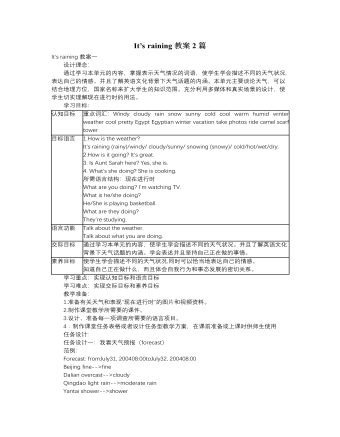
人教版新目标初中英语七年级下册It’s raining教案2篇
1 Each group choose one place to describe and what you are doing in it Choose one place, and describe what they are doing 2 Move around the room and give suggestions Talk about it and write it down 3 Ask one to show their works and act it Choose one of each group to make a report 4 Evaluate the best group and the best reporter Choose the best one Homework Ask your friends their ideal place and write about it教学反思:新课程标准中强调学生在课堂中的主体地位,在综合课中他们的主体地位就更加突出。在各个活动中给不同程度的学生不同层次的任务,让各层面的学生都有表现发挥的机会,从而产生对英语的兴趣。使用照片图片多媒体来辅助教学,效果更好。同时让了解其他国家风景,风俗的同学介绍ideal place,增加学生的背景知知识,实现跨学科交流的目的。教案点评:采用任务型教学模式,在各个活动中给不同程度的学生不同层次的任务,让各层面的学生都有表现发挥的机会,从而产生对英语的兴趣。使用照片图片多媒体来辅助教学,效果更好。让了解其他国家风景,风俗的同学介绍ideal place,增加学生的背景知识,实现跨学科交流的目的。

人教版新目标初中英语八年级上册How do you get to school教案2篇
Step Ⅶ Role play ( Work on 1b)1. First ask two students to read the dialogue to the class.Sa: How do you get to school?Sb: Well, I ride my bike to the subway station. Then I take the subway.2. Now work with a partner.Suppose you use two kinds of transportation to get to school \Hangzhou\Beijing... (bus, train, subway, walking, bike, etc.) Tell how you get there. You may use the phrases in 1a.3. Then ask different pairs of students to present their conversations to the class.Step ⅧListening1. Work on 2a(1) First ask students to read the list of information that Thomas wants to know.…where Nina lives.…how far from school she lives.…how long it takes to get to school.…how she gets to school.…what she thinks of the transportation.(2) Tell students what transportation and bus stop mean.bus stop 汽车站 transportation n. 运送;运输Then tell students we'll hear a recording. Please put a checkmark in front of each thing that Thomas wants to know.(3) Now play the recording for students.( Have students pay attention to the sample answer.) (4) Then correct the answers.
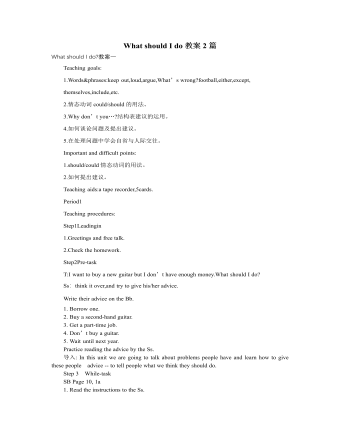
人教版新目标初中英语八年级下册What should I do教案2篇
说明:在帮Li Lei提建议的同时,教育学生如何学好英语。第三课时教学目标1. 语言目标:a) 词汇: Original, in style, haircut, the same as.b) 语言结构:My friend wears the same clothes and has the same haircut as I do.2. 能力目标:大多数学生能够谈论自己喜欢哪种服装,提高查找信息的能力。3. 情感目标:学会如何与朋友相处,要有自己对时尚的看法。教学重点掌握一些重要词汇。教学难点学会谈论问题,并能提出书面建议。◆教学突破首先针对Erin的问题,提出个人的建议,模仿2c部分的对话展开双人交际Pair-work;听老师诵读3a部分的信件,并找出LEFT OUT的问题所在;学生完成3b部分的内容,给Left Out提出书面的建议;学以口头形式提出自己目前存在的某个问题,讲给大家听,让同学们给自己提出一个建议,并作笔录;学生两、三个人分成一组,随意性地进行口语交际,谈论P14的第4部分的某个问题,相互交换意见。
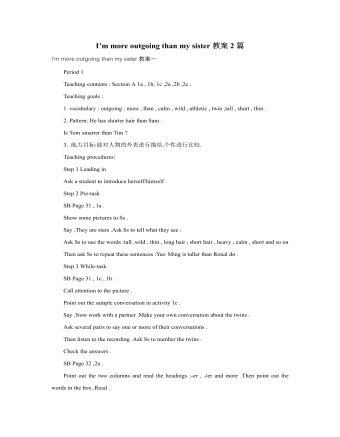
人教版新目标初中英语八年级上册I’m more outgoing than my sister教案2篇
1 交通工具的比较此活动为小组活动。学生通过讨论找出到达某一城市可乘坐的各种交通工具,并选择最佳出行方式。Teacher:We’re going to Shanghai. How many ways can we use to get there? Yes, there are four ways: by bus, by plane, by train, by ship. Please discuss how you are going to get there.操作建议:(1)学生以小组为单位展开活动,谈论本组所选择的交通工具。(2)各组选代表向全班汇报,阐述本组所选择的交通工具的利和弊。完成任务所需要的语言结构:We can go there by ship. It’s more comfortable and cheaper than any other transportation.We can go there by bus. It’s cheaper but it takes longer time.2 哪个城市更合适?此活动具有挑战性。假设中国要举行2014年世界杯足球赛,分别从历史,人文,天气等方面对各城市(北京,大连,上海,昆明)进行比较,选择最佳举办城市。T: Imagine China is holding the 2014 FIFA World Cup. Which city do you think is the best for the World Cup, Beijing, Dalian, Shanghai or Kunming? Let’s work in groups. If you choose Beijing, please join the Team Red. If you chose Dalian, please join the Team White. If you choose Shanghai, please join the Team Blue. If you choose Kunming, please join the Team Green. Please show us its advantages. Then let’s see which team will win.
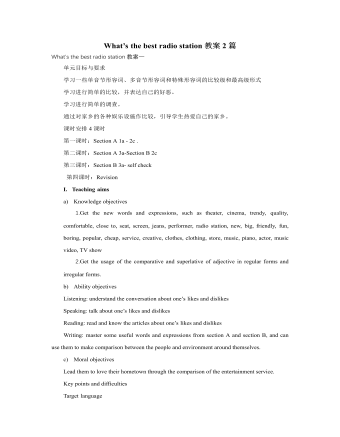
人教版新目标初中英语八年级上册What’s the best radio station教案2篇
教学重点和难点:运用所掌握的语言描述,比较不同地点的特点。在练习中学习掌握英语比较级和最高级的用法。课前准备分配小组,每组五至六人。通过上网或翻阅报刊杂志等方法,确定旅游线路,做出基本的旅游计划。教学设计:本节课流程图 学法指导:1.由于这是一堂新课,在教学中应注意面向全体,发挥学生的主体性,引导学生积极参与,激发学生的求知欲和学习积极性,指导学生积极思维,主动获取知识,养成良好的学习方法。逐步学会独立解决问题。总之要尽可能调动学生的非智力因素促进智力因素的发展。教法选择:1.电化教学法2.课堂讨论法3.任务型教学法采用这些方法的目的是为了充分调动学生的学习积极性,使学生变被动学习为主动学习。通过电脑形象的演示,加强印象,提高兴趣,突破难点,提高教学效率,进而增大教学的容量和信息量。充分体现教师为主导,学生为主体的教学原则。
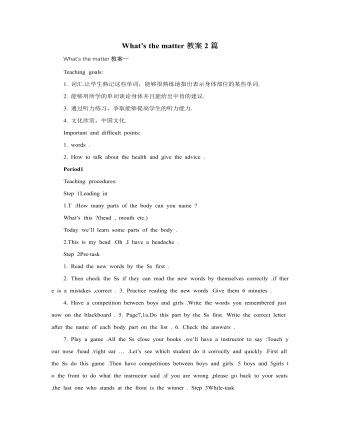
人教版新目标初中英语八年级上册What’s the matter教案2篇
She shouldn’t go to the party tonight.Step7. TaskT: You know, there are lots of problems in our life. If you are a doctor, please tell us how to solve the problem. I will divide you into 9 groups. Please work in groups. And then choose one of you to report your ideas.The following are the problems:I have a toothache.I am hungry. I have a sore throat.I am stressed out. I have a sore back.I am tired. I can’t sleep.I have a cold. I have a headache.Report: If you have a headache, you should go to bed early. You should see the doctor. You should eat some medicine. You shouldn’t wash your face with cold water.You shouldn’t sleep late.You shouldn’t swim.…..T encourages the students to give advice as much as possible.Homework:1. Chose one of the problems, and write down your advice2. Copy the new words这一步是用于热身的,同时也可以让他们复习一部分的表示人体部位的单词,扩充知识.学习语言的过程也是一个不断积累的过程,复习旧知识,增添新知识.通过小游戏,强化学生对Does she/he have…这个句子的运用能力.通过复习,自然的引到下面新知识的学习。充分利用表格,由句子到对话,再到文章,让学生循序渐进. 提高学生的综合语言运用能力,运用以前学过的知识来解决身边的问题.Period 5 (Section B 3a—3c, selfcheck)教学内容与分析:
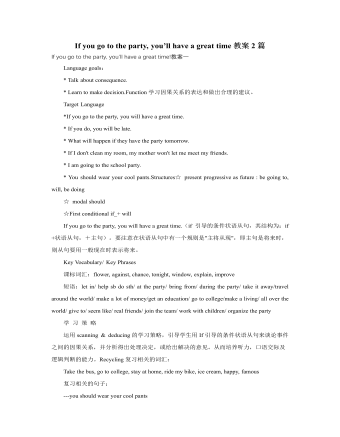
人教版新目标初中英语八年级下册If you go to the party, you’ll have a great time教案2篇
区分宾语从句、定于从句和状语从句宾语从句和状语从句,都叫做主从复合句。宾语从句主要是中考必考的,是初中阶段必掌握的从句,宾语从句主要是掌握三要素,所谓宾语从句,就是宾语在主从复合句当中充当宾语的一个句子,叫做宾语从句。主句的谓语动词是及物动词,后面如果是词或者是短语的话,是简单句,如果是句子的话,肯定是宾语从句。I know that he good at English.就是宾语从句,三要素,一要素是要注意连词,连词一共学了三类连词,一类连词是that口语当中可以省略,就像刚才说的那一句,I hear he is good at English.还有疑问代词、疑问副词,how where when,疑问代词、疑问副词。还有一类连词weather是否的意思,不是状语从句当中的如果,这一定要和如果区分开,这是是否。I don't know if he interested at English。宾语从句要注意if是连词。第二要素是语序,要用陈述举语序。比如说你家有几口人,我们都说How many people are there in you family?但是这是简单句,一旦说成宾语从句,你可以告诉我你家有几口人吗?Could you tell me how many people there are in you family ?

人教版新目标初中英语八年级下册It’s a nice day, isn’t it教案2篇
"Hello! Welcome to English class! Introduce yourself. Meet your new classmates." That's what the teacher says. What do you say? "Oh no!" It can be difficult talking to new people. But it can be fun, and you can make friends. How do you do it? Make small talk. Small talk is polite conversation. "Wang Nan is a great pingpang player, isn't she?" "I'd love to meet her, wouldn't you?" "It's been raining a lot, hasn't it?" Tag questions are a form of polite speech. To make small talk successfully, you should know how to make them. You should also know what topics to talk about. Try to learn this unit carefully. The next time you're in English class, you'll find out. Making small talk's easy, isn't it? (“你好!欢迎你!请做一下自我介绍。认识一下你的新同学。”通常在课上老师会这样说。你会说什么呢?“噢,不!”与陌生人谈话太困难了。但是这也很有意思,并且你还能交到朋友。你该怎么做呢?闲聊。闲聊指得是礼貌的对话。“王楠是一个很棒的乒乓球运动员,不是吗?”“我希望自己能认识她,你呢?“今年的雨水很多,不是吗?”反意疑问句是一种礼貌用语。为了使得谈话成功,你应该知道怎样去进行闲聊。你还应该知道与不同的人该谈论什么样的话题。认真的学习这个单元吧,下次在英语课上,你会发现与大家展开谈话是一件很容易的事情,不信我们来试试。)

人教版新目标初中英语八年级下册He said I was hard-working教案2篇
This activity introduces some new vocabulary and provide oral practice using the target language.Task 1 . Ask four students to stand in front of the class, and the teacher asks them the following questions as a reporter.1.What are you going to do when you grow up?2.What are you going to do next week?3.What are going to do after school?The students will give different answers, then ask a good student to report what they said.I am going to e a doctor.What did she say?----------She said she was going to be a doctor.I am going to have a party on Friday night.What did he say?-------He said he was going to have a party on Friday night.I am going to do my homework.What did she say ?------ She said she was going to do her homework.I am going home after school.What did she say?-----She said she was going home after school.Say In this unit we are going to learn to use words like to report what someone said.Task 2. Read the instructions. Then ask a student to read the four questions. And write the words on the Bb. Explain what soap opera is.Task 3. Ask the students to Look at the pictures, point out the TV screens in the picture. Ask one girl to read what Marcia said.What did Marcia say? She said She said she was having a surprise party for Lana on Friday night. Repeat the other pictures in the same way.Activity3. Listen and number the pictures in activity 1a.